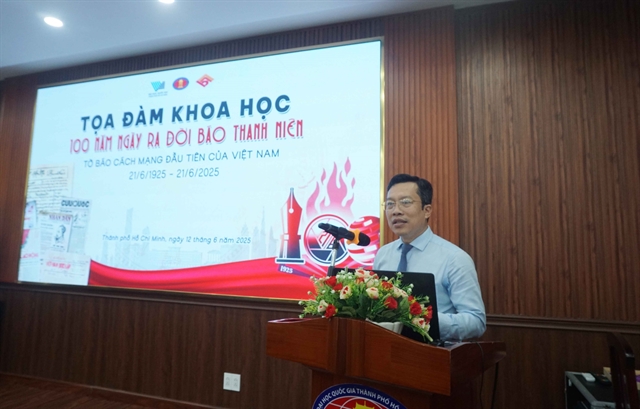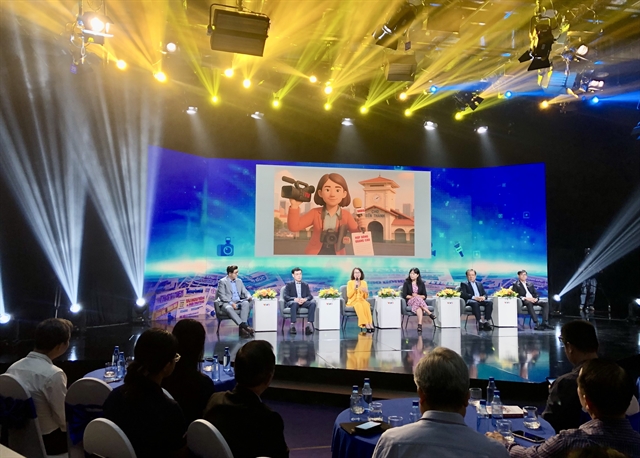 Society
Society

 |
| Lê Hoàng Dũng, Deputy Rector of the University of Social Sciences and Humanities – Vietnam National University Ho Chi Minh City, delivers the opening speech at the scientific seminar titled “100 years since the founding of Thanh Niên newspaper – Việt Nam’s first revolutionary newspaper” (June 21, 1925 – 2025). – VNA/VNS Photo Thu Hoài |
HCM CITY – Việt Nam’s revolutionary press has played an important role in preserving national values and providing a solid foundation for the country’s development, heard a seminar held in HCM City on Thursday (June 12).
The seminar themed “100 years since the founding of Thanh Niên newspaper – Việt Nam’s first revolutionary newspaper” was organised by the University of Social Sciences and Humanities – Vietnam National University Ho Chi Minh City (USSH, VNU-HCM). The event honours the 100th anniversary of the Việt Nam Revolutionary Press (June 21, 1925 – 2025).
Speaking at the seminar, Lê Hoàng Dũng, Deputy Rector of USSH, VNU-HCM, emphasised that Việt Nam’s revolutionary press has played a crucial role in preserving national values, shaping the country’s history, culture, and humanity, and providing a solid foundation for Việt Nam’s development.
The discussion highlighted the enduring significance of journalism in shaping public discourse, documenting Việt Nam’s historical struggles and achievements, and supporting the nation’s ongoing progress.
As Việt Nam’s revolutionary press undergoes restructuring and streamlining to adapt to the country’s new era of development, analysing and researching its historical values over the past 100 years will play a crucial role in defining its future position and impact.
During the seminar, experts, researchers, and journalism lecturers explored the historical process behind the founding, evolution, and growth of Thanh Niên and other revolutionary newspapers in Việt Nam, particularly during the early stages of the nation’s development.
They particularly highlighted the important contributions these publications made during the two long resistance wars for national independence and reconstruction.
Thanh Niên (Young People) newspaper was established on June 21, 1925, by late President Hồ Chí Minh, marking the birth of Việt Nam’s revolutionary press.
The newspaper was not only a source of information but also a powerful tool for political enlightenment among young people and patriotic citizens in Việt Nam.
Đoàn Hữu Hoàng Khuyên, a lecturer from the Faculty of Journalism and Communication at the USSH, VNU-HCM, said the launch of Thanh Niên paved the way for the emergence of around 100 other revolutionary newspapers between 1926 and the August Revolution of 1945.
The emergence of the revolutionary press also broke the monopoly on journalism that the French had tried to maintain throughout their 60 years of colonial rule in Việt Nam.
After the August Revolution of 1945, the revolutionary press began operating openly, becoming the official and mainstream journalism of the country to this day.
Delegates at the seminar, while discussing the history of Vietnamese journalism, emphasised that the journalistic legacy of Nguyễn Ái Quốc (Hồ Chí Minh) is not only remarkable in quantity – with more than 2,000 articles, hundreds of pen names, and content in multiple languages –but also serves as an unshakable ideological foundation for Việt Nam’s revolutionary press.
His writings were not only the product of intellect and knowledge, but also of a patriot’s heart, the unyielding will of a revolutionary, and an unbreakable faith in the power of the people, they said.
Transformation
On the same day, the Vietnam Television Centre in HCM City (VTV9) held a seminar titled Streamlined, compact, and strong journalism as part of the activities marking the 100th anniversary of the Việt Nam Revolutionary Press (June 21, 1925 – 2025).
The event offered an opportunity to reflect on the significant transformation of Vietnamese journalism amid efforts to streamline organisational structures, enhance financial autonomy, and accelerate digital transformation.
 |
| The Vietnam Television Centre in HCM City (VTV9) holds a seminar titled “Compact, Streamlined, Strong Journalism” on June 12 in HCM City, with the participation of numerous representatives from media agencies across the country. – VNA/VNS Photo Mỹ Phương |
Speaking at the seminar, Từ Lương, Director of VTV9, said: “As we urgently streamline our organisational structures and optimise resources, the issue of media economics is becoming increasingly pressing. The goal is to ensure that journalism is not only ‘streamlined’ in structure and ‘compact’ in operation, but also ‘strong’ in both content and financial capacity.”
Achieving this requires a comprehensive approach that addresses political, legal, professional, and audience perception issues – particularly in the context of implementing plans to restructure, merge, or rename media organisations, he said.
At the seminar, delegates focused their discussions on two key themes.
The first was journalism on the path to becoming “streamlined, compact, and strong”.
Many delegates emphasised that streamlining should go beyond simply merging organisations or reducing staff.
More importantly, it requires a shift in journalistic thinking, a reorganisation of news production processes, the application of technology, and the training of versatile reporters, they said.
The second topic was media economics and financial autonomy. As State funding continues to shrink and social media dominates the advertising market, news organisations are being forced to find new ways to generate revenue.
Delegates discussed effective media business models, the mechanism of State-funded information commissions through bidding processes, investment partnerships with businesses, and proposals for legal and financial policy frameworks for financially autonomous media outlets.
The seminar also provided a platform for media leaders to share experiences in implementing converged newsroom models, restructuring, and adopting modern editorial management from central to local levels.
Nguyễn Thị Minh Nhâm, Director of Bình Phước Radio – Television and Newspaper, shared the success story of their converged newsroom model.
“Our output of news reports has increased by 50 per cent thanks to the integration of four types of media,” she said.
All speakers at the seminar emphasised that, despite evolving models and organisational structures, the top priority remains safeguarding the identity, guiding role, and quality of information provided to the public. This is essential in shaping a Vietnamese revolutionary press that is professional, modern, and deeply rooted in humanitarian values.
Lương, Director of VTV9, reinforced this sentiment, stating: "Journalism is not just a profession—it is a mission. We must streamline operations to stay agile, achieve financial independence to expand our reach, yet always uphold our responsibility as a guiding force in society." – VNS